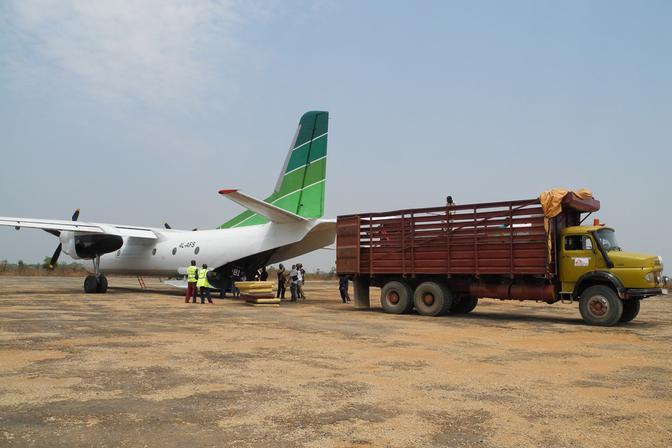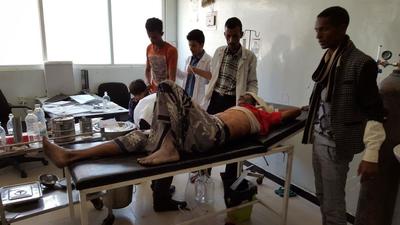The air smells of soil dust, basil and ash. The crackling of the fire over the wall in front of me replaces the image of the dancing flames behind the glass-topped brick wall. This marks the edge of our compound, the boundaries of my world most days.
My ears also pick up some shouting to my right, over the river; maybe anger, maybe celebration. Hard to tell from this distance. We know that with the elections a few days away, emotions could be running high. Black wisps of grass like inverted, elongated snowflakes fall around me as the afternoon stretches on.
The dusty soil and basil smell have filled the air in resistance to the dribble of water I shared with my balcony herb garden. This is the dry season and the suffering of my plants is a microcosm of the extended effect it has on the dusty landscape around us.
I am amazed at how hard it is to supply a project with everything the technical, operations and medical teams need to be able to function. It is complex, confusing, frustrating, and fascinating.
My last blog post was about ward rounds, and I promised myself I would spend every Saturday with the medical team at the hospital. Then supply happened, cargos happened, inventories happened, some things here, some things there and I realise I have not left my logistical world in weeks. Supply lines rely on functioning transport, not only between us and the capital, but between Douala and Bangui. This compounds what too many see as a simple case of order and delivery. Juggling these expectations and trying to pull favors for our cargo out of the capital means that I have not left the compound in way too long. I therefore believe it is high time I talked about the invisible world of supply.
I am a techie at heart, always trying to sneak off to look at a generator, but under that I am proud of the role I have here. I am amazed at how hard it is to supply a project with everything the technical, operations and medical teams need to be able to function. It is complex, confusing, frustrating, and fascinating. You realise how much your views on necessity and urgency have to shift. Probability and realism are daily questions you either concede to, or fight to change.
Perhaps unusually for a manager, I take every opportunity to find supply work that involves getting my hands dirty. The other day they got really dirty. Fuel, dust, probably rat droppings. We received a greatly appreciated, pre-Christmas, pre-elections camion of goods. Amongst these was a well needed T6 generator and some barrels of Jet A1 (for the plane). As per usual I bounced around moving boxes and fuel drums with the daily workers, which always makes my supply team - my assistant, two magaziners and two magaziner assistants - look on in horror. We are managers, we are meant to stay clean.

That day was different. As I juggled overseeing, shifting boxes, bantering about the logistics of moving generators, I noticed that my team were in the crowd of guys balancing the big blue monster on some empty fuel drums, and they were grinning at me. It took 10 guys to move the T6, everyone shouting, jostling each other, throwing around suggestions, even my assistant in his nice shirt. Then they mockingly beckoned for me to join them; I had to laugh.
I wonder sometimes what the national staff think of expats. In my job especially, I am a girl, I sometimes paint my nails, and then I help daily workers move boxes because I hate to see things and people just waiting around. I like to lead by example and all that. Now I have been here a few months I can feel my team are getting used to me, almost like they think I am both their manager and their slightly odd family member, who fumbles through with passable French and lots of hand gestures and laughter.
When it works medics can give vital drugs to patients, the technical team can change the parts in a faulty ambulance, allowing staff and patients to get to where they need to be, and the office staff have enough paper to print pages of complex looking charts and forms.
[[Article-CTA]]The funny thing about supply is that no one (except those doing it, in theory,) know how it really works. Things arrive, or do not, and people are happy or frustrated. When it works medics can give vital drugs to patients, the technical team can change the parts in a faulty car, allowing staff and patients to get to where they need to be, and the office staff have enough paper to print pages of complex looking charts and forms. But the line that connects these items and the other points in the supply journey is incomprehensible.
A supply logistician told me once about a truck that came across from Douala in Cameroon to Bangui when he first arrived in the project. It was blocked en route for two weeks, the drivers spending that time intermittently fleeing into the bush and attempting to keep the generator on board stoked with fuel. This truck was a refrigerated container, carrying medical items like malaria drugs, and the generator powered the cooling system. Had the driver not been good about it the whole container would have overheated, with the obvious effect on our precious drugs. The driver’s diligence, and potential risk-taking, is unknown at project level. But it is a great reminder of how many links in the chain there are in the work we do.
This invisible work is hard. But the support my team gives me, sometimes finishing my sentences or translating what I want to other people, makes me smile a wry smile. The links to the capital become as important as keeping a good relationship with the medics. You juggle a million things, many on email, but when a camion arrives, with all the things you have struggled to organise for people, I am ecstatic. The stores are full, the departments are content, and the project runs.
When it doesn’t arrive, however, is another story, but so far things are going well!





